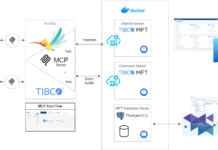Two more links of interest to the event processing community:
- Jim Sinur comments that the Japanese business process marketplace is “ready for dynamic BPM”…
A Goal of Greater Agility with BPM: The audience was keen to hear about the inclusion of complex events processing, business rules management, unstructured processes, process snippets and social technologies in the evolving BPM technologies. Japan has been a leader in standard processes for a long time and there is a need to make new and dynamic processes.
I see a continued differentiation in products here: for example, TIBCO AMX BPM is a very strong contender in the “conventional BPM” stakes, whereas the TIBCO BusinessEvents CEP tool us more for extreme performance, exception-riddled, unstructured (a.k.a. non-orchestrated) rule-driven operations… but of course these technologies can work together as needed.
- Doug Mow placed an article up on ebizQ on “Real Business Benefits for Real Time BPM”, covering “real-time claims adjudication” in the healthcare industry.
Using BPM to improve auto adjudication for claims validation, routing, eligibility check and payment submission can deliver huge gains.
This time it seems it is not CEP that is being confused (or conflated into) BPM, but business rules and decisions. Claim validation? Rules. Routing? Rules. Eligibility check? Rules. Payment submission? Ah – that could be a business process! And real-time rules are another term for event-driven rules… meaning, again, event processing.
Of course, this is not really “heresy” against the BPM community. The fact is that the term “business process” can be viewed as being much wider than the current BPM community – is not the detection of some event pattern a kind of process? In an agent that is matching events to decisions an event-driven process?





